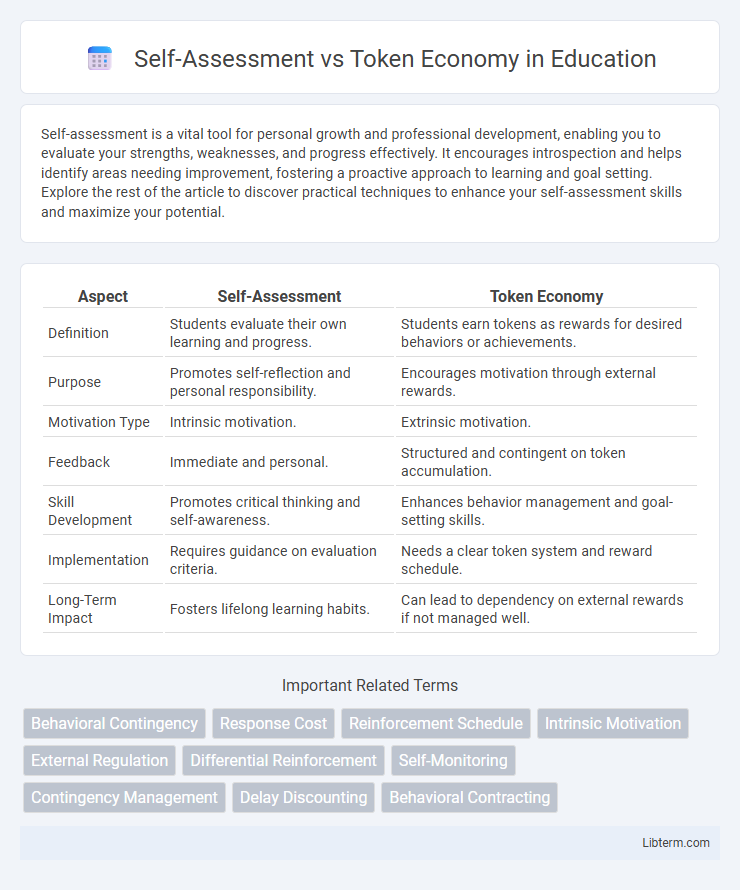Self-assessment is a vital tool for personal growth and professional development, enabling you to evaluate your strengths, weaknesses, and progress effectively. It encourages introspection and helps identify areas needing improvement, fostering a proactive approach to learning and goal setting. Explore the rest of the article to discover practical techniques to enhance your self-assessment skills and maximize your potential.
Table of Comparison
| Aspect | Self-Assessment | Token Economy |
|---|---|---|
| Definition | Students evaluate their own learning and progress. | Students earn tokens as rewards for desired behaviors or achievements. |
| Purpose | Promotes self-reflection and personal responsibility. | Encourages motivation through external rewards. |
| Motivation Type | Intrinsic motivation. | Extrinsic motivation. |
| Feedback | Immediate and personal. | Structured and contingent on token accumulation. |
| Skill Development | Promotes critical thinking and self-awareness. | Enhances behavior management and goal-setting skills. |
| Implementation | Requires guidance on evaluation criteria. | Needs a clear token system and reward schedule. |
| Long-Term Impact | Fosters lifelong learning habits. | Can lead to dependency on external rewards if not managed well. |
Understanding Self-Assessment: Definition and Principles
Self-assessment involves individuals evaluating their own skills, behaviors, or performance based on established criteria, promoting self-awareness and personal growth. It relies on principles such as honesty, introspection, and continuous reflection to identify strengths and areas for improvement. This method contrasts with token economies, which externally reinforce behavior through rewards; self-assessment centers on internal motivation and self-regulation.
What is a Token Economy? Core Concepts Explained
A token economy is a behavior modification system that uses tokens as conditioned reinforcers exchanged for desired rewards, promoting positive behaviors through structured incentives. Core concepts include tokens acting as secondary reinforcers, clear criteria for earning tokens through specific behaviors, and the establishment of a marketplace where tokens can be traded for backup reinforcers or privileges. This system enhances motivation and accountability by providing immediate, tangible reinforcement that bridges the gap between behavior and long-term rewards.
Key Differences Between Self-Assessment and Token Economy
Self-assessment involves individuals evaluating their own behaviors and progress, fostering self-regulation and intrinsic motivation through reflective practices. A token economy, on the other hand, utilizes external reinforcement by awarding tokens as rewards for desired behaviors, which can be exchanged for tangible privileges or items, promoting extrinsic motivation. Key differences include the source of motivation--internal in self-assessment versus external in token economies--and the method of behavior modification, with self-assessment relying on personal insight and token economies depending on systematic reward contingencies.
Psychological Foundations of Self-Assessment
Self-assessment relies on metacognitive processes where individuals evaluate their own behaviors and learning progress, enhancing self-awareness and intrinsic motivation. Rooted in cognitive theories, this method encourages reflective thinking and self-regulation, fostering a deeper engagement with personal goals. In contrast, token economies primarily use extrinsic reinforcement, where tokens serve as conditioned reinforcers to modify behavior through operant conditioning.
Behavioral Mechanisms Behind Token Economies
Token economies leverage operant conditioning principles by providing tangible reinforcers, such as tokens, immediately following desired behaviors to increase their frequency. Unlike self-assessment, which relies on an individual's internal appraisal and motivation, token economies use external rewards to strengthen behavior patterns through consistent positive reinforcement. The behavioral mechanism centers on the systematic exchange of tokens for backup reinforcers, creating a structured and motivating environment for behavior change.
Advantages of Implementing Self-Assessment
Implementing self-assessment fosters intrinsic motivation by encouraging learners to reflect on their own progress and identify areas for improvement, leading to deeper understanding and long-term retention of knowledge. It promotes autonomy and critical thinking skills, as students actively engage in setting goals and evaluating their performance rather than relying solely on external rewards typical in a token economy. This approach enhances self-regulation and accountability, essential components for lifelong learning and personal growth.
Benefits and Challenges of Token Economies
Token economies offer structured reinforcement systems that promote positive behavior changes by exchanging tokens for desired rewards, enhancing motivation and consistency in behavior management. They provide clear, immediate feedback and can be adapted for various settings, such as classrooms, therapy, and workplaces, supporting goal achievement and skill development. Challenges include the need for careful planning to prevent dependence on tokens, potential inequity in token distribution, and the requirement for ongoing monitoring to maintain effectiveness and prevent token fatigue.
Practical Applications: Self-Assessment in Real-Life Settings
Self-assessment enables individuals to monitor and evaluate their own behaviors and progress, promoting self-regulation and intrinsic motivation in settings like education and therapy. Token economies use external rewards to reinforce desired behaviors through a system of tokens exchangeable for privileges or items, effectively shaping habits in classrooms and behavioral programs. Practical application of self-assessment often leads to long-term behavior change by fostering personal accountability and reflective skills, whereas token economies are best suited for immediate behavior modification through structured reinforcement.
Token Economy in Schools, Workplaces, and Therapy
Token economy systems effectively reinforce positive behaviors by providing tangible rewards, widely applied in schools to improve student engagement and classroom management. In workplaces, token economies boost employee motivation and productivity by offering tokens exchangeable for incentives, enhancing performance and job satisfaction. Therapeutic settings utilize token economies to encourage desired behaviors in clients, supporting behavior modification and skill development through structured reinforcement.
Choosing the Right Approach: Self-Assessment vs Token Economy
Choosing the right approach between self-assessment and token economy depends on the desired outcomes and context of behavior modification or skill development. Self-assessment fosters intrinsic motivation and self-regulation by encouraging individuals to reflect on their progress, while token economies use extrinsic rewards to reinforce specific behaviors through tangible incentives. Evaluating factors such as individual autonomy, complexity of the task, and long-term sustainability helps determine whether a self-assessment method or a token economy system is most effective for promoting consistent behavior change.
Self-Assessment Infographic

 libterm.com
libterm.com